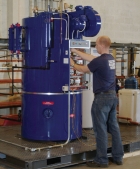Fulton helps hotel set up its own steam-operated laundry

Tewin Bury Farm Hotel in Hertfordshire is tackling its £80 000 a year laundry bill by installing a Fulton oil-fired steam boiler for its own on-site laundry. Owner and operator Vaughan Williams explains, ‘We don’t have a suitable electricity supply at the site to run an all-electric laundry system, so we opted for an oil-fired solution.’
He carried out research into similar hotel laundries, visited numerous sites and discussed options with several laundry-based installers. He concluded, ‘Everything pointed towards specifying steam, provided by a Fulton boiler.’
A J Series boiler operates the laundry’s dry-cleaning section and its larger steam laundry driers, washers and ironers. The boiler is also used for the back-up dryer and smaller roller ironers.
Fulton is also responsible for on-going servicing and maintenance.
The £200 000 facility is used five days a week, having secured contracts from other local business, including a golf club and hotel, and will meet or better the 5-year investment plan.
The farm also has 700 acres of arable land, and Mr Vaughan is looking to introduce malting barley to the crops grown and set up a micro-brewery served by the steam boiler.







